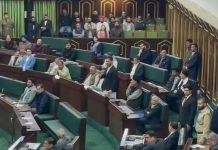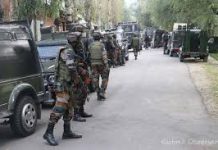Union Home Minister Amit Shah on Saturday said the Centre’s zero-tolerance policy towards narcotics is showing results and emphasised that states work in tandem with the Centre in the fight against the menace of drugs.
Shah, who was on a day-long visit to Chandigarh, also spoke about steps being taken by the Centre to weed out the problem of drugs while asserting that the zero-tolerance policy towards drugs was necessary to achieve the objective of a healthy society and prosperous nation.
Also, it was important from the security point of view as “the dirty money which is generated from the drug trade is used in activities against the country”, the minister said after inaugurating a two-day national conference on drug trafficking and national security.
The conference is organised by the Narcotics Control Bureau.
Punjab Governor Banwarilal Purohit, Jammu and Kashmir Lieutenant Governor Manoj Sinha, Haryana Chief Minister Manohar Lal Khattar and Punjab CM Bhagwant Mann, Home Secretary Ajay Bhalla and NCB chief SN Pradhan were present in the conference.
Shah also spoke about establishment of fast-track and exclusive courts for drugs-related matters.
Pointing out that the drug problem was more in Punjab, Shah assured complete support of the Narendra Modi government to the state for its fight against the menace.
He said the Centre will set up a forensic lab and a small centre of NCB in Punjab.
“Today Punjab CM is here. Everyone is saying this drug problem is more in Punjab and I feel that drug problem is more in Punjab. It is a border state and if the problem is more then we will have to make more efforts.
“If the state government allots land, the Centre will set up a forensic lab in Amritsar and a small centre of NCB for training purpose,” he said.
Laying emphasis on joint efforts for solving the drug problem, Shah said, “The Government of India stands shoulder-to-shoulder with the Punjab government to fight drug menace. We know we have to pull out the youth of Punjab from the drug menace. We stand with whatever efforts it makes.” While spelling out steps to check drug abuse, Shah said there has been a 200 per cent increase in the number of cases registered. During the past seven years (2014-2021), there has been a 260 per cent increase in arrests made, he said.
Shah said 1.52 lakh kg of drugs were confiscated between 2006-2013 while 3.3 lakh kg of drugs were seized between 2014-2021.
Between 2006 and 2013, Rs 768 crore worth of drugs were seized and the figure went up to Rs 20,000 crore in the 2014-21 period, he said.
Shah said when Narendra Modi became Prime Minister in 2014, the government of India adopted a zero-tolerance policy towards drugs, while adding the fight against drugs, which was progressing swiftly and in the right direction, has started showing results.
Shah said that drugs adversely impact the younger generation, harming it like termites, and stressed that the government was committed to eliminating the scourge. “We have to weed it out completely,” he said.



